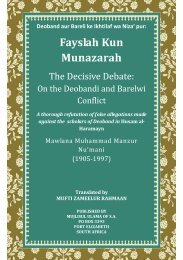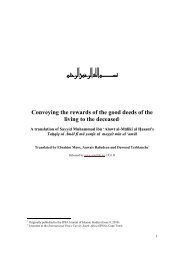al_etidaal_gn
al_etidaal_gn
al_etidaal_gn
You also want an ePaper? Increase the reach of your titles
YUMPU automatically turns print PDFs into web optimized ePapers that Google loves.
these amendments and changes there was bound to be differences among the various<br />
religions.<br />
Says the Quran:<br />
“Says the foolish ones among men: ‘What has turned them away from the Qibla<br />
which they were observing. Say to them Mohammed, to Allah belongs the east and (he<br />
west. He guides whomsoever He wishes to the right path’ “(2.142).<br />
As the sole Master of the Universe, Allah has the right that for a Qibla for the Ummah<br />
he may fix any direction He wishes. No one has any right to ask him the cause for his<br />
actions. And so <strong>al</strong>so Allah has enjoined various commands and ordinances for various<br />
religions throughout the ages. And for as long as those ordinances were in force it<br />
was obligatory to carry them out. When later other orders were given, those new ones<br />
became compulsory to be obeyed. So, this idea that there should be one set of<br />
regulations for <strong>al</strong>l times is quite irration<strong>al</strong>.<br />
“For every Ummat of you we have made a speci<strong>al</strong> Shariah Law and path. And if we<br />
had desired (to keep <strong>al</strong>l on one path) we would have (Jews, Christians, Muslims),<br />
made you one Ummat. But that He may try you by that Shariah which He had given<br />
you. “(V v 18)<br />
Secondly the causes for dissent in religions on secondary, non-basic, non-<br />
fundament<strong>al</strong> matters (furoo-i) and minor details comes not so much from scriptur<strong>al</strong><br />
sources but from practic<strong>al</strong> acts and passing events. This has been well explained by<br />
Shah W<strong>al</strong>yullah (Rahmatullah Alayh) in his book AlInsaaf, and I have given some<br />
detail about these in my discussion on the differences of opinion among the ulema.<br />
From those passing events and incidents certain laws were deduced. It is natur<strong>al</strong> that<br />
human beings differ in understanding from each other. Everyone has not the same<br />
power of understanding. The result is that because of the understanding and reasoning<br />
powers of various individu<strong>al</strong>s, different conclusions were reached. But then it should<br />
be noted that the Shariat made this type of deduction (ijtihad) permissible if done<br />
under speci<strong>al</strong> regulations. So what cause for anxiety is there?<br />
It is surprising that people daily tell their children: “You are still young and<br />
inexperienced to understand. When you are older you will surely come to<br />
understand.”<br />
Yet we consider ourself so perfect in understanding, perfect in intelligence and<br />
wisdom that we try to fully understand the Quranic verses which (Allah forbid) even<br />
Rasulullah (S<strong>al</strong>l<strong>al</strong>lahu Alayhi Was<strong>al</strong>lam) found inaccessible, and sO <strong>al</strong>so the S<strong>al</strong>iabah<br />
(Radi<strong>al</strong>lahu anhum). We claim to understand even better than the Sahabah<br />
(Radi<strong>al</strong>lahu anhum) and Tabi-een even though we do not come near to these people<br />
Al- Eti’da<strong>al</strong> Fi Maraatibur- Rija<strong>al</strong> 173




